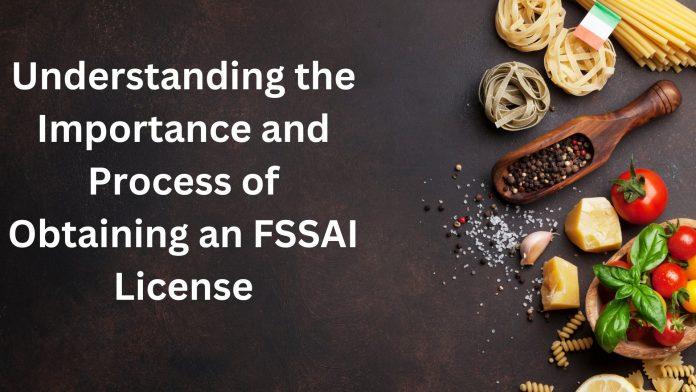Introduction:
The Food Safety and Standards Authority of India (FSSAI) plays a pivotal role in ensuring the safety and quality of food products available in the Indian market. One of the key mechanisms employed by FSSAI to regulate the food industry is the issuance of FSSAI licenses. This article aims to provide a comprehensive overview of the FSSAI license its significance, and the process involved in obtaining it.
Importance of FSSAI License:
Public Health and Safety:
The primary objective of the FSSAI license is to safeguard public health by regulating the quality and safety of food products. Obtaining an FSSAI license is a testament to a food business’s commitment to meeting the prescribed safety standards, ensuring that consumers are not exposed to health risks associated with contaminated or substandard food.
Legal Compliance:
Operating without a valid FSSAI license is a violation of the Food Safety and Standards Act, of 2006. Compliance with FSSAI regulations is not only a legal requirement but also establishes the legitimacy of a food business. Non-compliance can result in penalties, fines, and even the closure of the business.
Consumer Trust:
Consumers are increasingly becoming conscious of the quality and safety of the food they consume. An FSSAI license instills confidence among consumers, assuring them that the products they purchase meet the regulatory standards. This trust can translate into enhanced brand reputation and customer loyalty.
Market Access:
Many retailers, both online and offline, require food businesses to possess a valid FSSAI license before stocking their products. This requirement serves as a gatekeeping mechanism, ensuring that only compliant and safe products enter the market. Having an FSSAI license thus becomes a prerequisite for market access.
Process of Obtaining FSSAI License:
Determine the Type of License:
FSSAI offers different types of licenses based on the scale and nature of the food business. These include:
FSSAI Registration (for small businesses with an annual turnover below a specified limit)
State FSSAI License (for medium-sized businesses operating within a state)
Central FSSAI License (for large businesses with operations across multiple states)
Documentation:
Prepare the necessary documents required for the chosen type of license. Common documents include:
- Identity and address proof of the proprietor or partners
- Proof of possession of premises
- List of food products to be manufactured or processed
- Food safety management system plan
- Authority letter with the name and address of the responsible person
Online Application:
FSSAI has streamlined the application process through an online portal. The applicant must fill in the required details, upload the documents, and submit the application online. The applicant will receive an Application Reference Number (ARN) upon successful submission.
Payment of Fees:
After the submission of the application, the applicant needs to pay the prescribed fee based on the type and tenure of the license. The fee structure is available on the FSSAI website. The payment can be made online through various modes.
Application Review:
The FSSAI authorities will review the application and may request additional documents if necessary. The scrutiny process involves evaluating the food safety management system, infrastructure, and compliance with prescribed standards.
Inspection:
In certain cases, an inspection of the premises may be conducted by designated FSSAI officials to verify the accuracy of the information provided in the application. The inspection aims to ensure that the food business adheres to safety and hygiene standards.
Issuance of License:
Upon successful completion of the review and inspection process, the FSSAI license is issued to the applicant. The license contains a unique license number, details of the food business, and the validity period.
Also Check: Fssai License Renewal
Conclusion:
obtaining an FSSAI license is not just a regulatory requirement; it is a commitment to ensuring the safety and quality of food products. The process of obtaining the license involves meticulous documentation, online application submission, fee payment, and scrutiny by FSSAI authorities. Businesses that prioritize obtaining and maintaining an FSSAI license not only comply with legal obligations but also contribute to building a safer and more trustworthy food industry in India. As consumers become increasingly discerning, the FSSAI license serves as a badge of credibility, fostering consumer trust and enabling businesses to thrive in a competitive market.
